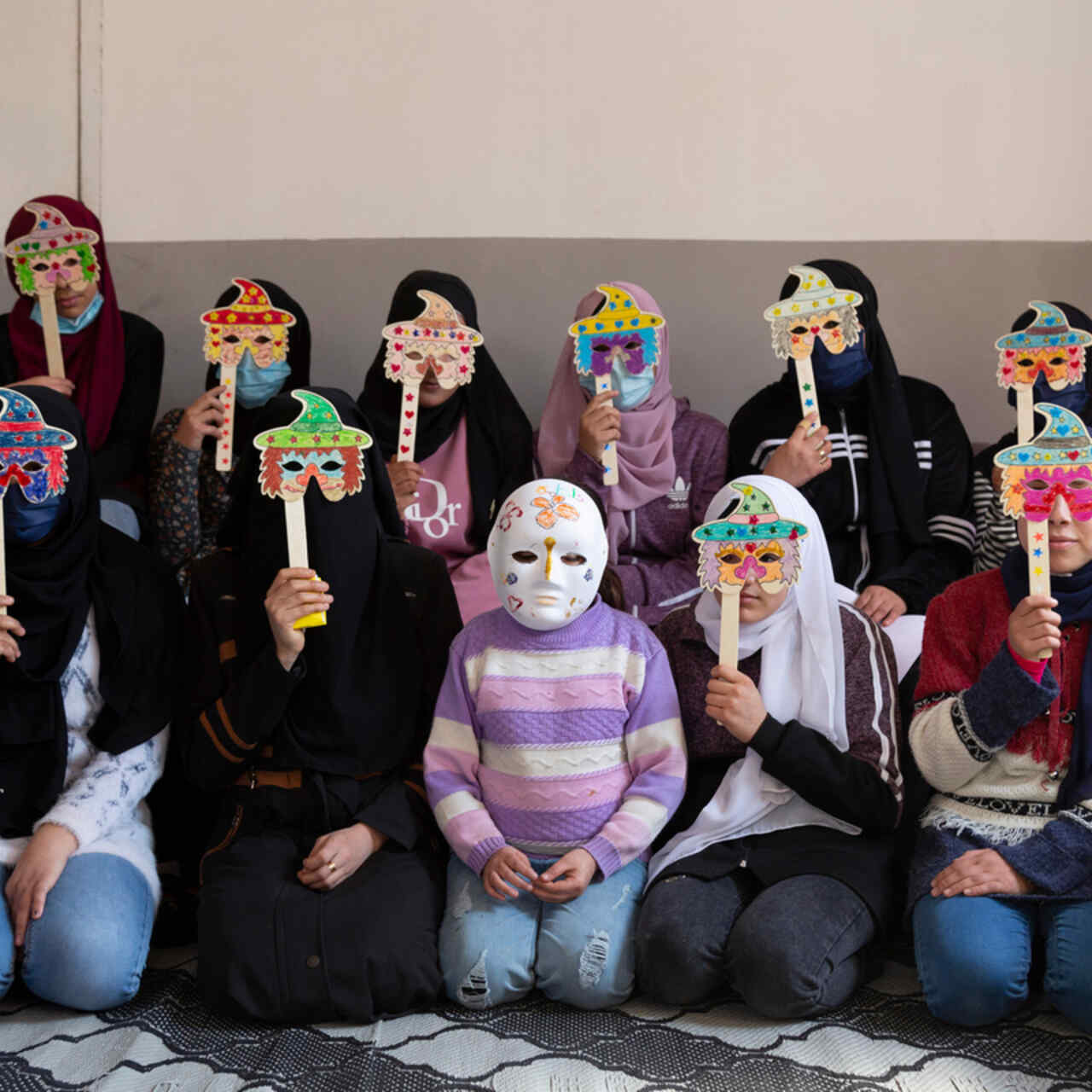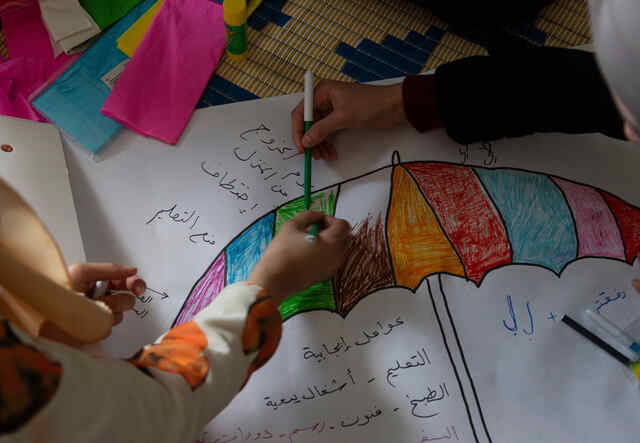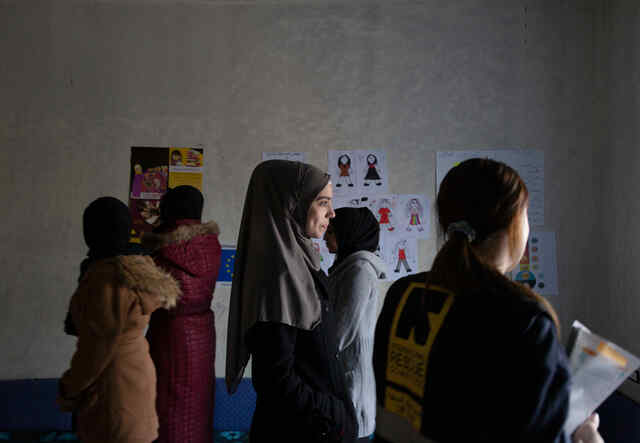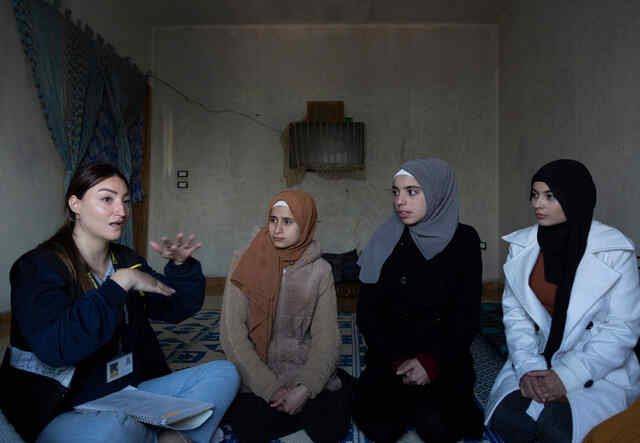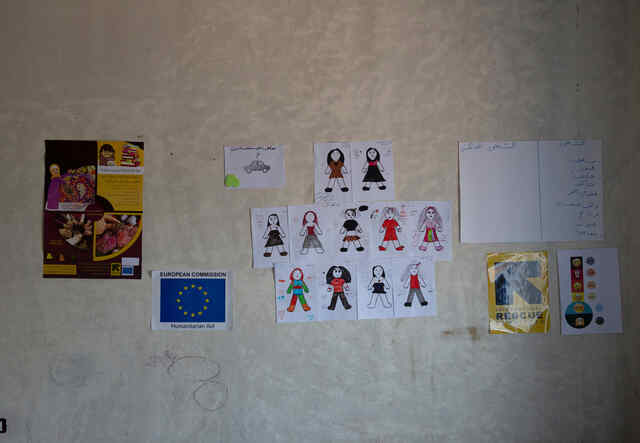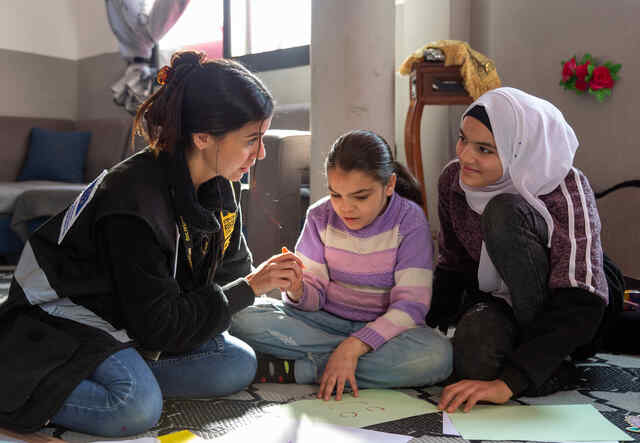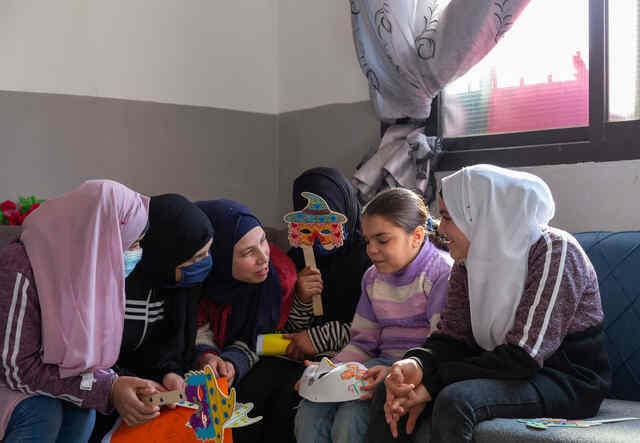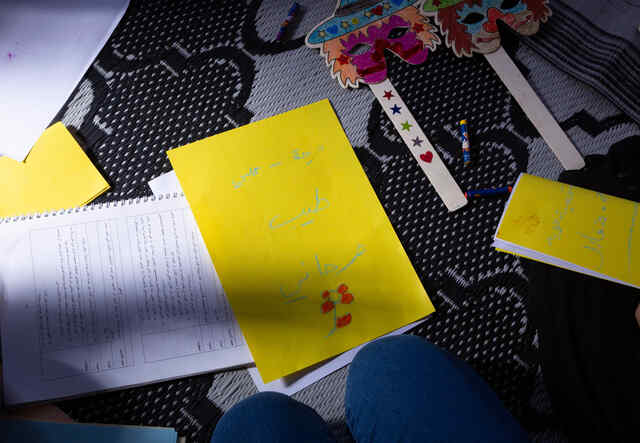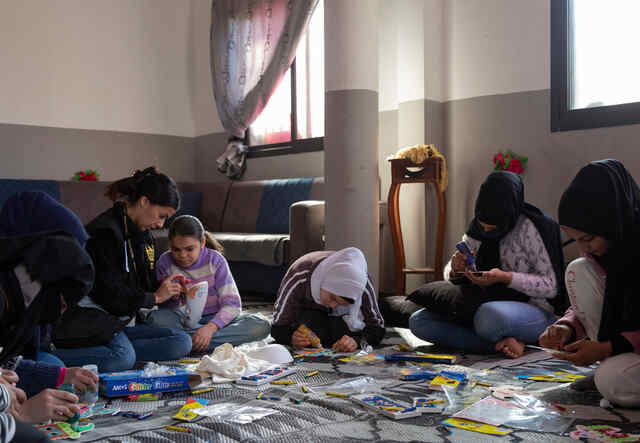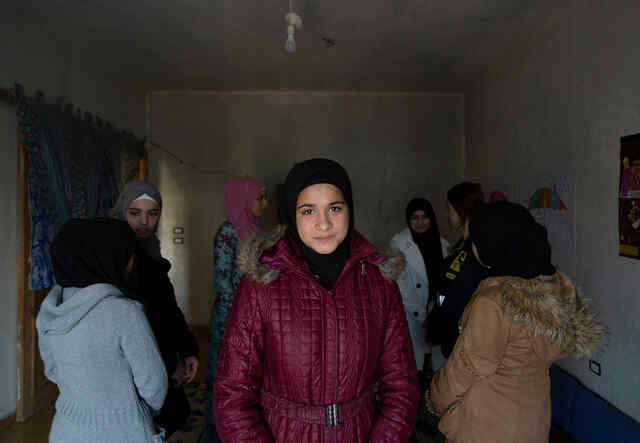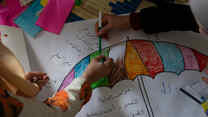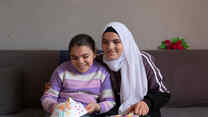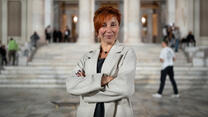In response to the assessment on prevalence of gender-based violence (GBV), the IRC launched a Women’s Protection and Empowerment (WPE) programme, funded by the European Union, to equip adolescent girls with knowledge and skills to prevent discrimination and help them create networks of support.
The Girls' Safe Spaces carry out sessions that provide psycho-social support; ranging from conversations around themes such as reproductive health, self-esteem, and decision-making, to activities that involve craftwork and dialogues that help them get to know each other better.
During an activity with the IRC Women's Protection and Empowerment team, Syrian refugee girls color and write on a carton inside a safe space.
Photo: Dalia Khamissy for the IRC
Sabah*
Sabah (centre) stands in the middle of a room surrounded by other Syrian refugee girls in the safe space where they take part in different kinds of activities with the IRC’s WPE team.
Photo: Dalia Khamissy for the IRC
Sabah* is a 15-year Syrian refugee who now lives in Lebanon with her family. She was formerly engaged to a man from her community, but after participating in WPE sessions she learned more about her right to education. Eventually she opened up to her parents about how she feels marriage would hinder her self-development. She made the decision to break up her engagement so she could resume her education.
Sabah*, 15, 2nd right, listens, with other Syrian refugee girls, to IRC Women's Protection and Empowerment Assistant Elissar Hababe, 33, left, as she explains about the activity that they will be doing in the safe space. Sabah*, who was engaged to a man from her community, decided to break up with him and focus on her education. After participating in reproductive health sessions, self-esteem and decision-making sessions at the center, she realised she was still too young to be married. She wants to continue her education and become a mentor at the IRC.
Photo: Dalia Khamissy for the IRC
The sessions also helped Sabah develop a support network with other girls. She also shares a close relationship with Elissar, the IRC’s Adolescent Girls Assistant in her area. Sabah says, “We are very grateful to Miss Elissar. She always tells us that a woman should be brave, and that there is no difference between a boy and a girl. She tells us that a woman should be firm and defend her rights. She should not be silent if someone harasses her - she should speak up and protect herself.”
The EU-funded sessions offer a safe space for young girls like Sabah* to build self-confidence and learn how to set boundaries.
Photo: Dalia Khamissy for the IRC
In the sessions run by Elissar, she teaches the girls how to confidently defend themselves, and which hotline to call to report any kind of harassment they might face. Sabah* talks about how great it is to attend the gatherings before school, saying “We have a lot of fun there, and we’ve made a lot of friendships.”
Read more of Sabah's story.
Ameera*
Women’s Protection and Empowerment (WPE) assistant Diana Khoury, 33, helps Ameera write her emotions on paper at one of IRC’s safe space sessions. Ameera’s sister Ruqaya, on the right, gives them company.
Photo: Dalia Khamissy for the IRC
Ameera*,15, is a Syrian refugee with special needs who attends the Safe Spaces sessions with her sister Ruqaya*, 14. Moving to Lebanon with her condition was not an easy feat but the IRC has adapted activities to fit in with the needs of those with disabilities. Together at the centre, the girls participate in playing with toys, drawing, colouring, and making tabbouleh.
Ameera speaks with the other Syrian refugee girls at the end of the drawing activity at the safe space session. The girls support her by telling her that her presence at the sessions is important to them.
Photo: Dalia Khamissy for the IRC
“Everything in her life changed,” says her sister Ruqaya*, “I felt like she became closer to me, too.” The other girls who attend the sessions with the sisters encourage Ameera*’s participation and ever since she has built a support network she has become much happier. Her father Samer* says, “Ameera* benefited a lot from the sessions. Three or four months ago, she did not mix well with children. She is now getting out of the house. She has the desire to explore. She has friends now.”
Read more of Ameera's story.
A paper is placed, on the carpet, on which a Syrian refugee girl had written the words “Cheerful - My heart is sweet - Joyful” in Arabic and drawn a red flower during an activity where they had to write their emotions on a paper at the safe space.
Photo: Dalia Khamissy for the IRC
Diana, 33, is another Adolescent Girls’ Assistant in Lebanon. She says, “The most important lesson that I teach the girls is always to speak out and seek support because it's the first step to help their self-esteem, self-confidence, and to actually solve their problems.”
IRC Women's Protection and Empowerment Nanager Diana Khoury, 33, helps Ameera*, 15, draw on a tridimensional mask during a drawing activity at IRC’s safe space.
Photo: Dalia Khamissy for the IRC
Diana assigns the girls handicraft activities to build trust with them. She ensures that everything talked about in the sessions will remain confidential in order to create a space where they can openly talk about their problems. “The girls have the opportunity in the safe space, to feel safe,” she says, “Everyone here in the room shares the same fears, the same thoughts, and they can actually seek the support they need.”
Syrian refugee girl Khadija*, 14, stands in the middle of the room during a game led by IRC’s Women's Protection and Empowerment Manager Elissar Hababe, 33, 2nd right, in the safe place where Syrian refugee girls take part in different kind of activities led by the IRC team.
Photo: Dalia Khamissy for the IRC
About our work with the European Union
